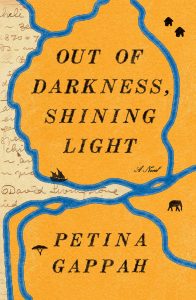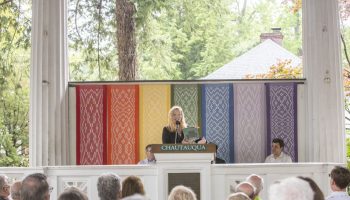To say that writing a Chautauqua Prize-winning historical novel like Out of Darkness, Shining Light takes a lot of research is an almost laughable understatement — it took 21 years for author Petina Gappah to finish it.
“I remember at one time spending something like $4,000 for a huge collection of stuff,” said Gappah, a Zimbabwean author and lawyer, in an interview with The New York Times. “I had to not eat lunch for three months.”
Out of Darkness, Shining Light is the story of those who transported the body of the explorer David Livingstone across the African continent, all so that Livingstone’s body could be returned to England.
Research for the book was so intensive, Gappah published three other books while she was working on it, in addition to working as an international trade lawyer.
The $7,500 annual Chautauqua Prize celebrates a book that provides a richly rewarding reading experience and honors the author for an indispensable contribution to literature. That author, Gappah, will offer a reading from Out of Darkness and a lecture at 3:30 p.m. EDT Monday, Aug. 10, on the CHQ Assembly Video Platform.
“Last year, out of some 200 books that were nominated for The Chautauqua Prize, the judges chose Darkness,” said Sony Ton-Aime, Chautauqua’s director of literary arts. “It’s an amazing novel. It’s a retelling of David Livingstone’s story, but this time from the perspectives of the slaves who carried his body across Africa.”
That change in perspective is what makes the novel so essential, Ton-Aime said, because it functions as a way to “give some humanity to these people and the journey they took, and their triumph.”
“To see African slaves as human, as a fully autonomous people, is something that makes this book worthy of The Chautauqua Prize,” he said. “Petina herself is an amazing writer. This is an important prize for Petina — but she’s also no stranger to receiving awards: Her work has been short-listed for the Orwell Prize, the Sunday Times EFG Short Story Award, the Los Angeles Times Book Prize and the Frank O’Connor International Short Story Award.”
Gappah’s interest in Livingstone began when she was 16 and her school studied a curriculum on African history, she said in an interview with The Guardian. Initially, Gappah was inspired by and sought to emulate William Faulkner’s novel, As I Lay Dying, which utilizes multiple different narrators as a way of telling the story. But after careful consideration, Gappah said she decided to put the focus of the novel on Livingstone’s companions instead.
“Livingstone was an absolute gossip and his journals were valuable — he wrote about other people, but also about nature, ants, leaves,” she told The Guardian. “The most interesting snippets, I weaved into the story. I learned Swahili to write this book — it’s an amazing language. I lived in Zanzibar to write some of it. I did research at the David Livingstone Memorial Trust. It was so moving to see the room where he grew up with his family and to understand the poverty of his life. I think he connected with poor people in Africa because he himself came from a poor background.”
To Gappah, the role of the novelist is similar to that of explorers like Livingstone — and in fact, Gappah said that “what characterizes a lot of the characters in my new book is wanderlust.”
“When I was a child I wanted to be an explorer,” she told The Guardian. “I wanted to find the source of the Nile, I didn’t realize it had been found. And I wanted to go to the South Pole — I was obsessed with Captain Scott. In my own life now, journeys matter to me, a lot. I travel a lot. My most recent trip, which was mind-blowing, was a container-ship journey across the Atlantic from Dunkirk to Martinique and Guadalupe and back again.”
Out of Darkness, Shining Light is a title that Gappah said comes from her desire for her work to radiate goodness and light, even when the work itself deals with the darkness and tragedy of the human condition.
“I’m interested in goodness,” she said in her Guardian interview. “I will write about dark things — injustice, a collapsed Zimbabwe — but I want goodness to shine through; the idea that beautiful things can happen out of horrible situations. (This book is about) loyalty, commitment, love — and all of those things are related to goodness.”
Gappah said she was “delighted” to accept the 2020 Chautauqua Prize.
“My primary identity is that of a reader, so it is wonderful to receive an award that is given to books that offer a ‘richly rewarding reading experience,’” she said in a Chautauqua Institution press release announcing the Prize winner. “I am grateful that through the power of this award, Livingstone’s companions will now travel to readers who might otherwise not have heard of them. Thank you so much to Chautauqua Institution for this honor, but most of all, thank you for your abiding belief in the power of literature.”




